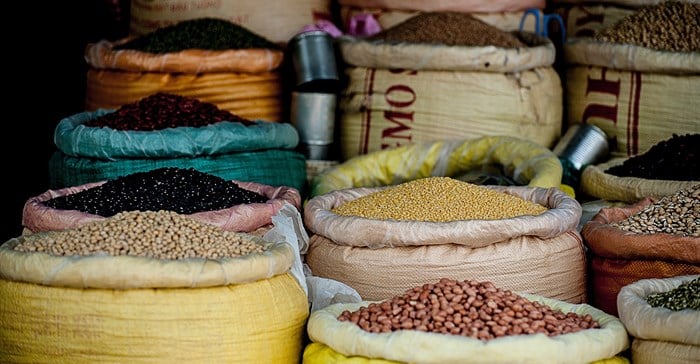When Ugandan farmer Eveline Aryemo first tried the NABE 15 improved bean variety, she did not know that this seed contained superior abilities to not only tolerate drought conditions and diseases common in her farm but also triple yields.
The seed was promoted by the International Center for Tropical Agriculture (CIAT) and Uganda’s National Agricultural Research Organisation (NARO) together with partners. A truly “climate-smart” technology, the drought tolerant variety has helped Aryemo meet market demands and farm in challenging climate conditions.
NABE15 cooks faster than most of the other commercial varieties and thus requires less firewood, reducing greenhouse gas emissions and saves time for women to engage in other activities. When grown in drought-stressed environments it is more productive compared to other varieties, which assures women farmers of a surplus for sale and hence income for home expenses such as the purchase of other food items to diversify the family meals.
Farmers in Africa - big and small - know they need to get climate-smart in this way. Hunger still stalks the continent, and climate change is a key culprit for low productivity. Africa’s ability to feed itself hinges on investment in adapting to these conditions and minimsing agriculture’s own contribution to climate change, as Aryemo has done.
But where will this investment come from? Impacts from climate change on people in sub-Saharan Africa are expected to be some of the greatest compared to other regions by 2100, yet the continent currently only receives 5% of climate funding.
The answer is to identify the technologies that are actually going to pay off for African farmers – quite literally. By analysing what will work in which region, we can remove the risk that makes investments in African agriculture so daunting.
Scientists at the International Center for Tropical Agriculture have led an effort to produce detailed guides on the status of and opportunities for investment in climate-smart agriculture (CSA) in fourteen African countries. These profiles provide, for the first time, a scientific framework to guide future CSA financing in Africa and de-risk investment in the sector.
We not only analysed the approaches that will work in each country but also provide recommendations on how to develop the technical, policy and investment conditions to achieve sustainable agricultural development for food security under climate change.
Our CSA profiles provide the science to give donors the confidence to invest in African agriculture, demonstrating the best bets for a payoff – not just in terms of increased profits for farmers but in terms of climate change adaptation and mitigation as well.
A new climate for business opportunities
In addition to on-farm interventions like Aryemo’s super bean, options exist to make entire food systems more climate-smart and profitable at the same time.
Take the dairy industry, for example. As temperatures rise, quality sources of animal feed decline. But scientists have found that improved feed, such as the drought-tolerant brachiaria grass have an additional benefit of boosting milk production by up to 40%. When animals are more productive, the carbon emissions associated with their production of a unit of meat and milk go down. The business of producing brachiaria grass in South America is worth $600m. We are now working towards bringing commercial production of the grass to Africa, starting in Zambia. This will not only provide a huge economic opportunity but also contribute to food security and climate change targets.
The provision of services such as weather information and insurance programs are also being shown to pay off.
Acre (Agriculture and Climate Risk Enterprise) is the largest agricultural insurance program in sub-Saharan Africa. Acre offers a wide range of products, including insurance linked to agricultural credit from Micro-Finance Institutions (MFIs), and a product that links insurance to a replanting guarantee by a seed company. The insurance premium is incorporated into the price of a bag of maize seed. Each bag contains a scratch card with a code that is texted to Acre at planting time to start coverage against drought.
Each farm is monitored using satellite imagery for 21 days. If the index is triggered, farmers are automatically paid via the M-Pesa mobile phone platform. The indexes that Acre uses for its insurance projects are based on several data sources including solar-powered automated weather stations, satellite rainfall measurements, and government area yield statistics. Acre has 200,000 farmer clients in Kenya, Tanzania and Rwanda. Insured farmers have invested 19% more in farm productivity, resulting in 16% more earnings compared to their uninsured neighbours.
The bottom line of our research is that no matter how big or small agricultural enterprises in Africa are, they are businesses. Just as with all business expansion plans, a risk analysis must be performed before investment can be increased. Our CSA profiles provide the science to give donors the confidence to invest in African agriculture, demonstrating the best bets for a payoff – not just in terms of increased profits for farmers but in terms of climate change adaptation and mitigation as well.
We believe that if new investment can be unlocked for African agriculture, the continent can be on its way to being both future-proof, and food secure.
Dr Caroline Mwongera is a farming systems and climate change scientist with the International Center for Tropical Agriculture (CIAT).








































